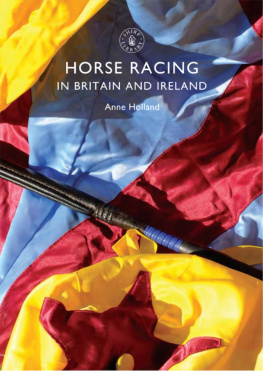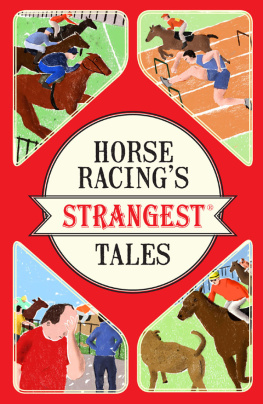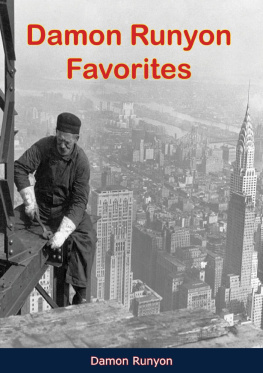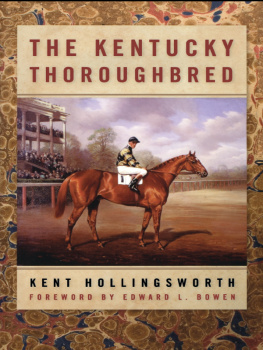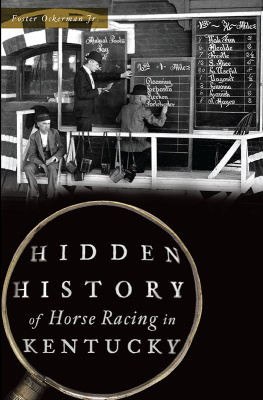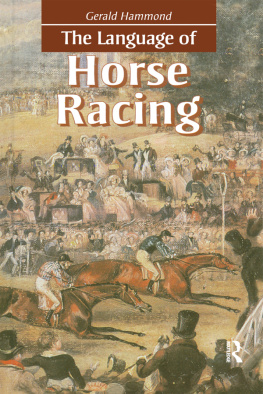Capsule biographies of some of the people youll meet in the pages.
Isidor Bieber: Just the kind of compelling character that fascinated Runyon, Bieber was, as the New York Times once described him, something of a mystery mana player of many roles. Among those roles were streetcar operator, ticket speculator, one-hundred-thousand-dollar bettor, Broadway dandy, barkeep, soldier, crusader, street fighter, and horse owner and breeder. Runyon once spoke of writing a book about Bieber because Biebers so fantastic. But he never did, admitting in the next breath that my heart couldnt stand it.
Often outspoken, Bieber was a sharp dresser, highly opinionated, and even as an older man, ready to fight at the drop of an imagined insult. Bieber was fined half a dozen times by The Jockey Club for fighting at the track, although he always insisted he never threw the first punch. His temper may have stemmed from his many nicknames, ranging from Izzy and Kid, which he despised, to Colonel and Beebe, which he tolerated.
Bieber insisted there were three things wrong with the worldsex, slaughter, and smoke. He had nothing against sex but he disliked what he termed its overemphasis in movies and novels. He was more vocal in his hatred of smoking, and backed his crusade by the names he gave some of his horses, including Puffaway Sister, Kansirette, Shedontsmoke, and Burnt Lips. On the other hand, other names for his horses stressed world brotherhood, from Hail to Reason to Hate War, Reason Is One, and Hail to All.
Bieber achieved his greatest success after Runyons death, partnering with Hall of Fame trainer Hirsch Jacobs in one of racings most unusual partnerships. Jacobs was a devoted family man, humble and quiet, but together the two men became the countrys leading money-winning breeders, led by the great Stymie, the colt they bought for fifteen hundred dollars that would go on to earn $918,485.
Col. Edward R. Bradley: The most successful horse owner of the 1920s and 1930s, Col. Edward R. Bradley lived a life lifted from a Horatio Alger novel.
Bradleys Idle Hour Stock Farm in Kentucky produced multiple winners in all three Triple Crown races, most of which carried names that began with the Bradley B. By the time of Bradleys death in 1946, he had bred 128 stakes winners, including fifteen champions, among them Blue Larkspur, Baba Kenny, Balladier, Black Helen, Bimelech, Busher, and Bridal Flower. You get the idea.
Idle Hour Stock Farm became one of the leading breeding operations in the United States, greatly contributing to Kentuckys place as the most important horse breeding state in America and the Kentucky Derby as the countrys premier race. Indeed, Col. Bradleyhis title was granted by the governor of Kentucky as a Kentucky Colonelbecame so connected with Kentucky that it was often assumed that he was a native.
In fact, Bradley was born in the western Pennsylvania steel town of Johnstownthe subject of a Runyon column in this volumeand arrived in Kentucky after a long and winding road. At age fourteen, Bradley was working as a roller in a Johnstown mill before heading for Texas in 1874 to work on a ranch. According to legend, he traveled about during the Wild West era, working as a gold prospector, a cowboy, and a scout for General Nelson A. Miles during the Indian War campaigns.
Bradley was still of middle age when a physician advised that some outdoor activity would lengthen his life, and he found in horse racing an outlet that provided fresh air but also plenty of action. He owned a few horses and then in 1906 bought a Kentucky farmrenamed Idle Hour Stock Farm by his wife, Agnesand Bradley was on his way.
Col. Bradleys impact on racing went well beyond establishing a successful broodmare operation. In 1926, he purchased the Fair Grounds in New Orleans and spent lavishly to renovate the historic racetrack before reselling it eight years later. In the interim he also became an investor in Hialeah in Florida, which would become the winter center of the sport both in terms of fashion and of quality racing.
Despite his self-professed identity as a gambler, Bradley was a devout Catholic and was beloved for his generosity to charitable causes, both within racing and in other aspects of society. Among them was staging an annual race meeting at Idle Hour to benefit orphans. In 1946, Bradley died at his farm; he was eighty-six.
Nick The Greek Dandolos: The eventful life of Nick the Greek Dandolos encapsulates the many highs and lows of a big-time gambler. Born in Crete to wealthy parents, Dandolos emigrated to the United States at age eighteen, to Chicago and then to Montreal, where, supported by his grandfathers weekly allowance, he gambled on horses.
In Montreal, Dandolos won more than five hundred thousand dollars at the track, and then moved back to Chicago, where he lost it all on card and dice games. He quickly became a master of these gamespoker, in particular. Nobel Prizewinning physicist Richard Feynman once met him, according to the autobiographical Surely Youre Joking, Mr. Feynman!, in which Nick the Greek explained his success at the tables by knowing the odds and betting against others who have superstitious beliefs about the outcome.
Dandolos claimed that when asked to escort Albert Einstein around Las Vegas, he introduced him as Little Al from Princeton, because his gambling comrades might not otherwise recognize the name. Dandolos said he did the same when asked by a friend from the U.S. State Department to help Einstein find a poker game in Manhattan. That time, Nick the Greek claimed he introduced Einstein as Little Al from Jersey.
Late in life, Dandolos was near-broke and playing five-dollar-limit draw poker games in Gardena, California. When asked by a fellow player how he could once play for millions and now be playing for such small stakes, Dandolos supposedly replied, Hey, its action, isnt it?
Nick the Greek died on Christmas Day in 1966 and was a charter inductee of the Poker Hall of Fame in 1979.
Nat Evens (Evans): Runyon described this associate of Arnold Rothstein as a genteel, high-class sporting man... one of the nicest chaps I ever met. But according to baseball historian Bruce Allardice, Nathaniel Isaac Evenskys pleasant demeanor concealed a propensity for underhanded dealings. The owner of Saratogas exclusive Brook Club was a shadowy figure, particularly in his work with Rothstein to ensure the fixing of the 1919 World Series.
Evans was Rothsteins man on the scene, dispatched to New York in the weeks before the World Series under the name of Rachie Brown to hand over eighty thousand dollars in cash to members of the Chicago White Sox to ensure the team would throw the World Series. Reports vary on Evans involvement, but White Sox pitcher Lefty Williams, one of the fixers, testified that another gambler, Sport Sullivan, and Brown met the players at Chicagos Warner Hotel before the series to hammer out the details.
Years later, World Series fixer and ex-prizefighter Abe Attell, admittedly not the most truthful of men, asserted that Rothstein entrusted Evans with one hundred thousand dollars to pay off the players, with instructions to withhold payment until the players lost the series. Evans laid down large sums of cashpresumably Rothsteinson the eventual victors, the Cincinnati Reds. According to Attell, Rothstein double-crossed Evans and the two had a falling-out. In the end, Evans gave White Sox ringleader Chick Gandil the promised money, and it appears Gandil kept most of it.
In October 1920 Brown and three other gamblers were indicted by the Cook County grand jury for their part in the fix, but Evans was not indicted, at least not under his own name. Cook County officials seem to have been unsure of Browns true identity.
In the years afterwards, Evans was held in high regard in sporting circles with his presence at important horse races and championship fights routinely noted alongside New York City Mayor Jimmy Walker, Broadway impresario Florenz Ziegfeld, Babe Ruth, and Irving Berlin.


